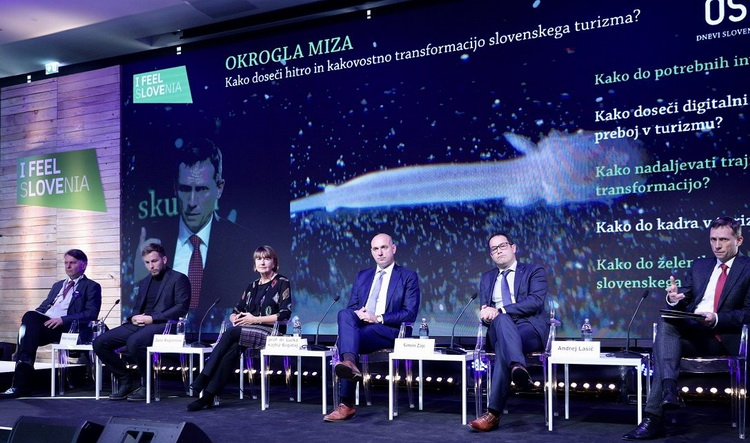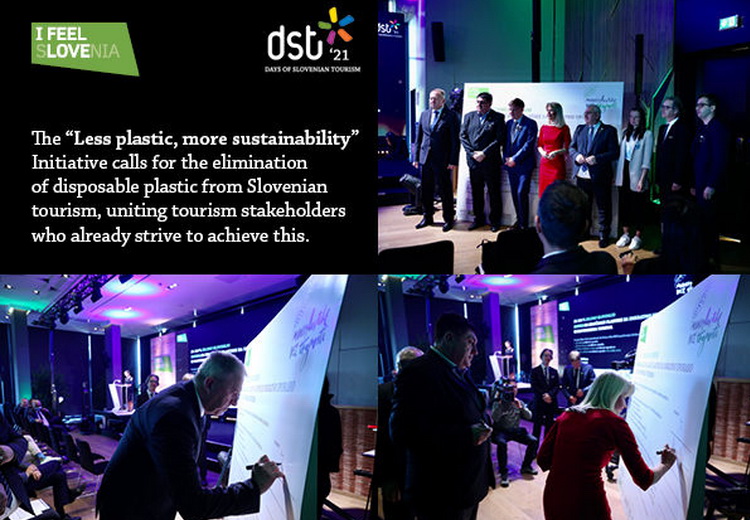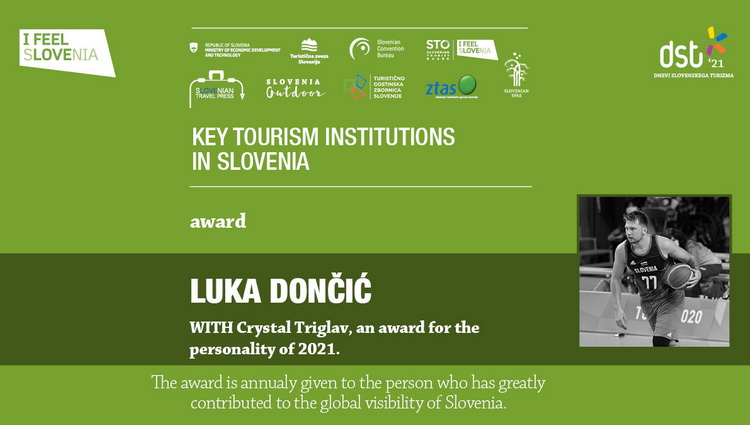The Days of Slovenian Tourism, the largest tourism professional event in Slovenia, take place in a hybrid form in Postojna, (13–14 October) under the theme: IT IS TIME. TIME FOR TRANSFORMATION. The focus of the plenary sessions was put on the future of Slovenian tourism, highlighting global trends and key challenges on the path to recovery and transformation of Slovenian Tourism. In addition, the “Less plastic, more sustainability” Initiative, which calls for the elimination of disposable plastic from Slovenian tourism was signed.

The biggest crisis in the history of tourism requires a transformation of management and marketing that will be sustainable and digital. With the new tourism strategy and with the help of the National Recovery and Resilience Plan, it is necessary to accelerate the construction of the tourist future which needs to be friendly to the guest, the local population and the tourism industry. Tourism found itself in an extremely demanding period, but this also brings opportunities for creating even better, even more innovative, even stronger, and goal-oriented tourism and its long-term resilience.
The Plenary Day evaluated the last strategic period of Slovenian tourism, gave a look at the issues of survival, recovery and future of tourism, sustainable and digital transformation, new business models, values and success criteria in tourism. The representatives of the key partner organizations of the Days of Slovenian Tourism highlighted the challenges and opportunities facing Slovenian tourism. This was followed by expert presentations and a round table entitled How to achieve a fast and quality transformation of Slovenian tourism.
A number of renowned professionals and experts in the field of tourism and economy gathered on this occasion. The speakers highlighted the necessity for a change to ensure more efficient, sustainable, inclusive and competitive tourism. Slovenian tourism has a good foundation for rapid and successful transformation, especially thanks to sustainable development.
Before the roundtable discussion, the participants of the Plenary Day were addressed by representatives of key institutions that organised Days of Slovenian Tourism. The participants were greeted by Marjan Batagelj, President of the Management Board of Postojna Cave Jama. The measures for recovery and resilience were presented by Zdravko Počivalšek, Minister of Economic Development and Technology. MSc. Maja Pak, Director of the Slovenian Tourist Board (STB), emphasized that a sustainable and digital transition is a condition for higher added value in tourism, and that new balanced performance indicators need to be developed. The challenges and opportunities of the tourism industry were presented by Andrej Prebil, President of the Chamber of Tourism and Hospitality of Slovenia. Blaž Cvar, President of the Section for Hospitality and Tourism at the Chamber of Commerce and Industry, emphasized the importance of qualified staff, which forms the basis for quality in tourism. Pavle Hevka, President of the Tourist Association of Slovenia, also addressed the audience.
How to achieve a fast and quality transformation of Slovenian tourism?
The roundtable entitled “How to achieve a fast and quality transformation of Slovenian tourism” highlighted the need for transformation, if we want to ensure recovery and long-term resilience, efficient and profitable management, agile competition in the global tourism market, and successfully address desired target groups and obtain financial resources for much-needed investments.
The speakers agreed that Slovenian tourism has a good foundation, which now urgently and quickly needs to be upgraded. Sustainability is the cornerstone of Slovenian tourism and must be woven into all the pores of the industry. The Days of Slovenian Tourism provided numerous questions, as well as inspirations and opportunities for transformation, which will help achieve a fast and high-quality transformation of Slovenian tourism. Tourism stakeholders from the public, private and civil spheres pinpointed that tourism is one of the few industries that crisis situations, such as Covid-19, make stronger and even more connected and united. The crises as this one, encourage to (re)think, reprogram and adjust the compass to the right goals. The pandemic has accelerated structural change, sustainable orientation, digitalisation, awareness of the importance of trust in travel, safety, talent and the invaluableness of the human factor in tourism.
The need for balance of economic, environmental and social sustainability indicators, which is the key to success and at the same time the basis for the industry’s attractiveness in terms of employment, was highlighted. Tourism must be friendly to the guest, the local population and last but not least to the tourism industry.
Among the speakers were renowned Slovenian experts and professionals, including MSc. Peter Geršak, State Secretary at the Ministry of Digital Transformation of the Republic of Slovenia, Simon Zajc, State Secretary at the Ministry of Economic Development and Technology, climatologist Prof. Dr. Lučka Kajfež Bogataj, Andrej Lasič, Assistant to the Management Board for Corporate and Investment Banking at NLB, d.d., Jure Repanšek, Director of Alpinia d.o.o., and Peter Vesenjak, Director of Hosting consulting company.
The crisis should be taken as an opportunity for tourism
Several presentations discussed the Covid-19 crisis and its challenges as well as opportunities. In his presentation entitled “Key Geopolitical and Economic Challenges for the Next Decade”, Prof. Dr. Mojmir Mrak emphasized the great changes in the geopolitical image of the world. Doug Lansky, a Swedish tourism consultant and speaker at numerous international conferences, highlighted the major impact of the corona-crisis on tourism and presented several examples of good practice for the development of sustainable and successful tourism. Tomislav Čeh from PKF Hotelexperts GmbH highlighted various management models in the hotel sector. Sarah Barrel, editor of National Geographic Traveler, said that the media giant sees Slovenia as a tourist destination, innovatively and proactively presenting itself as a destination for sustainable, gastronomic and active holidays, which is very relevant content for their readers and followers.
Less plastic, more sustainability
Within the Days of Slovenian Tourism, the “Less plastic, more sustainability” Initiative, which calls for the elimination of disposable plastic from Slovenian tourism, was signed by the organizers of the Days of Slovenian Tourism and the project ambassador, chef Luka Košir. Other stakeholders in Slovenian tourism are also invited to sign the commitment for less plastic and more sustainability.

The highest awards in Slovenian Tourism for 2021
At the gala event, awards for those who have greatly contributed to the visibility of Slovenia as an excellent tourist destination have been presented. Among the awarded for 2021 are also Luka Dončić, who received Crystal Triglav for the Personality of the Year 2021, and Mark Cuban, who was chosen for the Ambassador of Slovenian Tourism 2021.

Key conclusions of the DAYS OF SLOVENIAN TOURISM 2021:
- The crisis should be taken as an opportunity for tourism
- There is a need for transformation, if we want to ensure recovery and long-term resilience, efficient and profitable management, agile competition in the global tourism market, and successfully address desired target groups and obtain financial resources for much-needed investments.
- Slovenian tourism has a good foundation, which now urgently and quickly needs to be upgraded.
- Sustainability is the cornerstone of Slovenian tourism and must be woven into all the pores of the industry.
- Tourism is one of the few industries that crisis situations, such as Covid-19, make stronger and even more connected and united.
- The pandemic has accelerated structural change, sustainable orientation, digitalisation, awareness of the importance of trust in travel, safety, talent and the invaluableness of the human factor in tourism.
- Balance between economic, environmental and social sustainability indicators, which is the key to success and at the same time the basis for the industry’s attractiveness in terms of employment, was highlighted.
- Tourism must be friendly to the guest, the local population and last but not least to the tourism industry.
The Days of Slovenian Tourism are co-organized by all major partner institutions in the field of tourism in Slovenia: Ministry of Economic Development and Technology, Slovenian Tourist Board, Tourist Association of Slovenia, Chamber of Tourism and Hospitality of Slovenia, Section for Hospitality and Tourism at the Chamber of Craft and Entrepreneurship of Slovenia. Chambers of mountain centers, the Association of Tourist Agencies of Slovenia, the Association of Slovenian Natural Health Resorts, the Slovenian Convention Bureau, the Association of Tourist Journalists of Slovenia, Slovenia Outdoor and others.